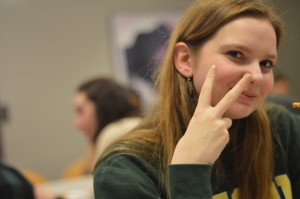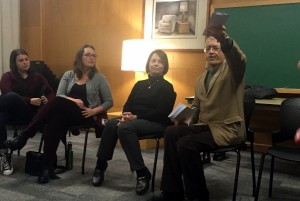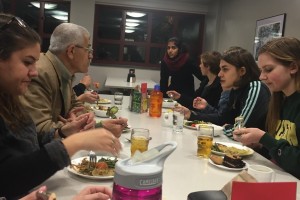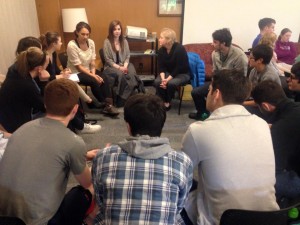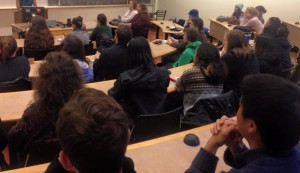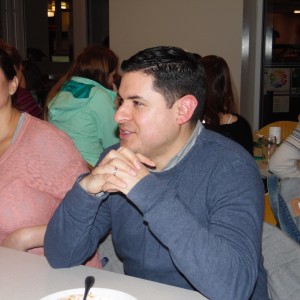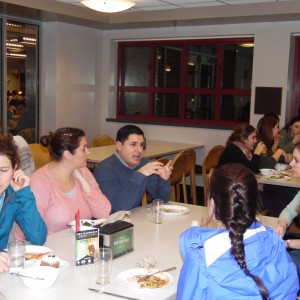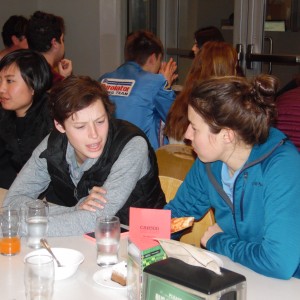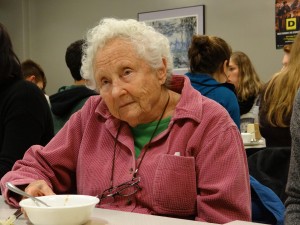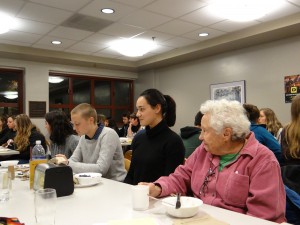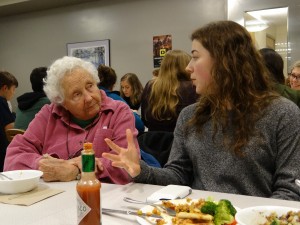By Kate Goldsworthy & Pierre Haou
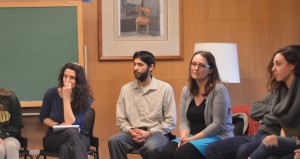 Rabbi Ruhi Sophia Motzkin Reubenstein certainly made some powerful impressions Wednesday night. She has recently been appointed the head of Temple Beth Israel Synagogue in Eugene. She is originally from Saratoga Springs, New York, and she has spent most of her time on the east coast. Rabbi Ruhi was born within a family of the Reconstructionist Movement within Judaism, and both of her parents are rabbis.
Rabbi Ruhi Sophia Motzkin Reubenstein certainly made some powerful impressions Wednesday night. She has recently been appointed the head of Temple Beth Israel Synagogue in Eugene. She is originally from Saratoga Springs, New York, and she has spent most of her time on the east coast. Rabbi Ruhi was born within a family of the Reconstructionist Movement within Judaism, and both of her parents are rabbis.
Her husband, Jacob Siegel, joined Rabbi Ruhi in our discussion. He is currently in rabbinical school, although he is a modern orthodox student while Rubenstein represents the Reconstructionist movement within Judaism. This brought up a discussion about the differences between these ways of approaching the practice and philosophies of Judaism. Siegel explained that Orthodox Jews are more conservative in their interpretation of religious texts than the more liberal Reconstructionists. This brought up a lively discussion about specific issues, and how both Reubenstein and Siegel interpret and handle those issues.
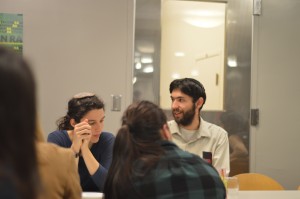 When applying for jobs, Rabbi Ruhi admitted that she had applied to Temple Beth as a practice for other application, as she was looking for employment on the east coast, a little closer to home. When she was offered the job, however, she realized she was drawn in by Eugene’s close-knit communal feel. During the conversation she would often come back to the importance that she and her husband place on community.
When applying for jobs, Rabbi Ruhi admitted that she had applied to Temple Beth as a practice for other application, as she was looking for employment on the east coast, a little closer to home. When she was offered the job, however, she realized she was drawn in by Eugene’s close-knit communal feel. During the conversation she would often come back to the importance that she and her husband place on community.
Rabbi Ruhi said one of her main goals coming to Temple Beth Israel is community building, which is something the Reconstructionist movement considers important. She also emphasized the importance she places on the environment. Eugene appealed to her because she is certain that when the earth starts to have environmental catastrophes, which she says swill happen in the next fifty years, she can take comfort in being able to hunker down in a small town with her community.
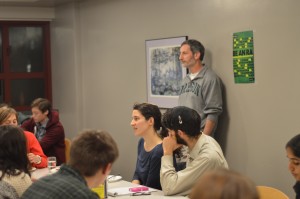 She takes this sense of community very seriously and this is what struck students most about her visit and discussion. Arguably one of the most poignant things she said regarding community was “We are all responsible for each other and the entire world. The world can only be saved by local communities.” This was stated in the context of climate change and peak oil. Her belief in the preservation of the world was really inspiring.
She takes this sense of community very seriously and this is what struck students most about her visit and discussion. Arguably one of the most poignant things she said regarding community was “We are all responsible for each other and the entire world. The world can only be saved by local communities.” This was stated in the context of climate change and peak oil. Her belief in the preservation of the world was really inspiring.
She talked a lot about compassion too. In particular, she spoke on compassion as a prerequisite for a functional society and said “Love your neighbor, but don’t let them get out of control hurting people.” She also brought up an example from her father when she said “the more annoying a person is, the more pain they’re in.” One of her self proclaimed greatest struggles is having compassion when people come to her with short sighted or selfish issues. In reference to this, she said “I do a lot of sharing of values.” As Rabbi, she explained that it is not her role to decide whether or not someone’s struggle is valid– her only duty is to show compassion for their struggles, no matter how small and no mater what her personal opinion of their struggle is.
In terms of ethics; she raised some interesting issues. Do we value what is ethical over what is pragmatic? Are the two synonymous? She best expressed her stance when she said “it is pragmatic to care for everybody.” In our discussion with her we delved into the issue of action versus intent, and often in our discussions intent wins out as the more ‘ethical’ frame; however she put an interesting spin on the issue. “In Jewish tradition, you don’t have the right to choose not to give. Giving isn’t charity, it’s an obligation.” In my mind, this seems entirely ethical, and action demonstrates much more intent to do good than someone who sits around all day and discusses all the good they want to do. I feel that the greatest thing she left us with, though, is a more ethically minded perception of pragmatism.
